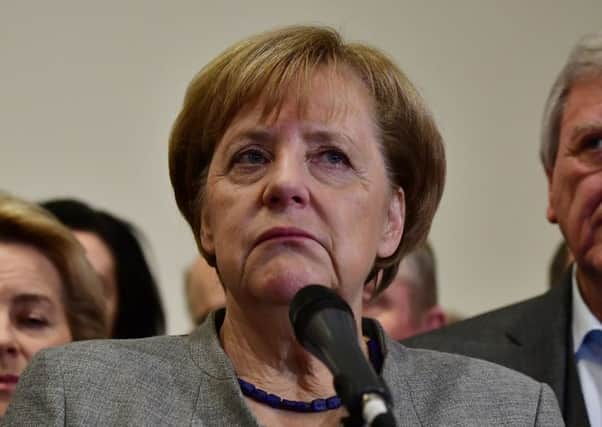'˜Sceptical' Angela Merkel says second poll better than minority rule


Her dramatic comments came after the country’s president appealed to political leaders to rethink their positions and try again to form a new government after coalition talks between Mrs Merkel’s conservatives and two parties collapsed.
But there was little immediate indication his call would be heeded, and a new election looked increasingly likely.
Advertisement
Hide AdAdvertisement
Hide AdThe conservative Mrs Merkel spent four weeks haggling with the pro-business Free Democrats and the traditionally left-leaning Greens on a new, untried governing coalition until the Free Democrats walked out Sunday night.
Her partners in the outgoing government, the center-left Social Democrats, said yesterday they would not join a new Mrs Merkel administration, a stance the party has repeated time and again since it slumped to a disastrous defeat in Germany’s election in September. No other politically plausible combination of parties has a majority in parliament.
“We now face a situation that we haven’t had in the history of the Federal Republic of Germany, so in nearly 70 years,” President Frank-Walter Steinmeier told reporters after meeting Mrs Merkel. It is Mr Steinmeier who will have to decide whether to pave the way for a minority government or a new election.
“This is the moment at which all parties should pause and reconsider their position,” he said. “I expect from everyone readiness to talk, in order to make the formation of a government possible in the foreseeable future.”
Mr Steinmeier said he will meet leaders of all the parties involved in the failed talks, in the coming days.
Mrs Merkel, meanwhile, said the situation was “regrettable” but insisted that “we nevertheless have stability in our country.” It’s likely to be a while before the situation is resolved.
If neither the Free Democrats nor the Social Democrats budge, that leaves as the only options another election or a minority government - a setup that has never been tried in post-Second World War Germany. The German Constitution does not allow parliament to dissolve itself, so the decision lies with Mr Steinmeier.
“I don’t have a minority government in my plans,” Mrs Merkel said, “I don’t want to say never today, but I am very sceptical and I think that new elections would then be the better way.”
Advertisement
Hide AdAdvertisement
Hide AdHowever a new election may produce an equally awkward situation, with polls so far suggesting results would be similar to last time. Mrs Merkel made clear that her pre-election pledge to serve another full term stands and that she was ready to run again.
She said: “I was always asked in the election campaign, ‘Will you be ready to serve Germany as chancellor for four years?’ Two months have passed [since the election], so it would be very strange to say that what I told voters during the whole election campaign doesn’t stand anymore.”
The Social Democrats’ leader, Martin Schulz, insisted the outgoing government “got the red card” from voters. He said his party is “not available” for a repeat, even without Mrs Merkel in charge, and that a minority government “is not practicable in Germany.”
The nationalist Alternative for Germany, which emerged from September’s election as the third-biggest party, welcomed the coalition debacle.
“Mrs Merkel has failed,” party co-leader Alexander Gauland said. “We think it’s time for her to go.”
Other European countries expressed concern, with French President Emmanuel Macron saying that “it’s not in our interest for it to get tense.”